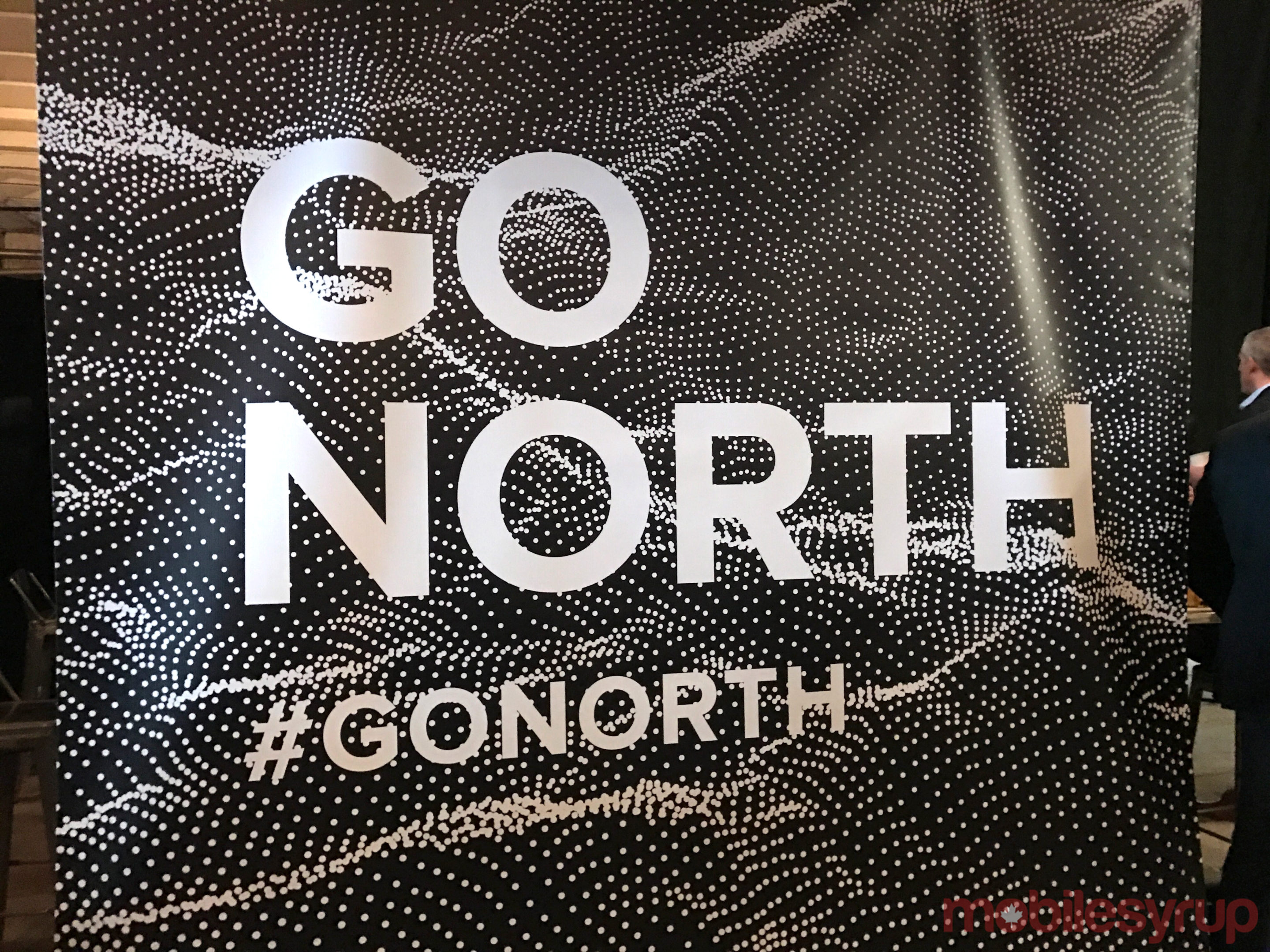
“There’s something in the water in Waterloo,” said Thalmic Labs product manager and developer relations Scott Greenberg.
After recently opening an office in San Francisco, the Canadian wearable tech company became part of the ongoing debate about the relationship between the Canadian and American tech ecosystems.
As it turns out, even at a Canadian tech conference, the United States is the elephant in the room. The scent of Silicon Valley sits heavy on every panel and every discussion. This, however, isn’t as discouraging as it might seem.
Considering Canada is situated directly above what’s come to be known as the largest innovation ecosystem in history, it’s to be expected. However, Google Canada’s GO North event for Canadian tech professionals demonstrated some tangible faith in Canada’s ability to be a competitive ally in the space.
Google Canada took the opportunity through Go North to launch a $5 million prize for nonprofit innovation called the Google.org impact challenge. Google.org, the company’s philanthropic division, will award the money across 10 organizations to help launch their ideas.
Five winning organizations will receive $750,000, while an additional five will receive $250,000. The deadline for eligible non profits to submit ideas is November 26th. It seems that for the first time, Google sees Canada as an ally rather than as just a small market.
While the Canadian tech landscape has certainly evolved from the tumbleweeds-in-the-desert scene it projected ten years ago, it’s been hard to consolidate that growth when the country’s innovation hubs — Toronto, Kitchener-Waterloo and Vancouver — are so far apart.
GO North brought the community together in a way few members of it had seen before. People they’d only ever spoken to on the phone were recognized by their name tags and people who’d supported each other in spades on Twitter were forced to talk to one another other face to face.
Panelists featured some of Canada’s most well-known tech titans, including Shopify’s Harley Finkelstein, Dragons Den’s Michelle Romanow, Kik’s Ted Livingston and Mappedin’s Hongwei Liu. Google Canada CEO Sam Sebastian opened the event with a few words of encouragement.
“Canada is no longer a place defined by the limits of its geography,” said Sebastian.
It’s true that over the past five years the world has finally begun paying attention to their northern watchdogs. Canadians have been in the spotlight as of late, in ways that go beyond our innovation community.
“From the perspective of a new Canadian, what we have here is pretty exceptional. The spirit of openness and inclusion shapes not only our national identity but in how we work together,” continued Sebastian.
While a spirited, Canada’s innovation community is desperately outnumbered.
Some of the event’s key topics included being confident enough to attract American investors, selling to American customers, getting acquired by American companies and familiarizing the United State’s technology hubs.
By this point, one begins to sense a theme.
“Canada is probably the best place in the world to live if you’re forming a tech company,” said Shopify CFO Harley Finkelstein.
He can’t in good conscience however claim that Canada is in a place where it doesn’t need the United States. “Silicon Valley is Mecca. You need to get your butt down there.”
While Canada isn’t ready to stand on its own just yet, it’s definitively clear that the population’s collective attitude towards the United States is changing.
The first wave of big-time Canadian entrepreneurs, who were once intimidated by the thought of breaking into the United States, have discovered an eager cohort of newly minted founders with whom to share their experiences.
The Michelle Romanows and Tobias Lüktes of the country have made tech entrepreneurship a less lonely endeavor. Romanow, who’s founded several notable companies, including Snap Saves, which was acquired by Groupon in 2014, claims that she wishes she targeted the United States sooner, and encourages today’s founders to do just that.
“It’s not that the U.S. is ten times bigger, it’s that the U.S. sets the technology agenda for the rest of the world. If you’re a technology platform and you win the U.S., the rest of the world will come in after,” she argues.
While discussions during the conference barely wavered from Silicon Valley, rather than focusing on its inarguable importance, the event’s panelists steered the conversation towards weaning Canada off its influence.
Several Canadian companies have acted on the desire to give Canada a leg to stand on, whether that means maintaining a Canadian head office or developing a uniquely Canadian voice.
Thalmic Labs’ Scott Greenberg, who presented at GO North, explains that though the company has just opened an office in San Francisco, it’s home will always be in Waterloo, Ontario. Thalmic Labs is the developer of the Myo armband.
“We are very proudly Canadian. We are very much proud to be here. However, San Francisco, New York and the startup centres are extremely influential and they have a lot of experienced people there,” he states.
Thalmic Labs is one of the Canada’s most notable wearable technology successes. While it has offices in both Waterloo and San Francisco, the company has strategically decided to maintain its headquarters in Waterloo.
It bears some resemblance to a company which most people have forgotten has a Canadian connection — Pebble. Founded in Waterloo, the company keeps just a small engineering office in Canada, and has gone on to become an international success.
The question that remains is, have we entered a phase in the country’s development where a company with a Canadian head office will be considered equal to American-based companies by investors who get just a glimpse of a company’s culture?
Finkelstein thinks so. In fact, this is one of his goals for Canada’s tech sector going forward.
“As a Canadian entrepreneur that runs a Canadian company, I want to see more head offices here instead of satellite offices,” said Finkelstein.
Furthermore, in the quickening decline of Canada’s resources economy, the Canadian government is taking definitive steps to ensure that the country has a future in technology.
Navdeep Bains, the Federal Minister of Innovation, Science and Economic Development, believes in Canada’s innovative future. In addition to playing a critical role in the development of Canada’s innovation agenda, Bains has proposed a cluster-based approach to maintaining the hubs, such as those in Toronto and Vancouver, that have developed naturally.
“The digital economy is now the economy itself,” he proclaimed in a speech given during Go North. “Virtually every sector of the economy is propelled by digital technologies.”
While it sounds rehearsed from the mouths of experts such as Bains, Finkelstein and Romanow, who’ve sat on dozens of panels and time and time again pushed entrepreneurship to eager crowds, the audience seemed behind them every step of the way.
It seems that, for the first time, the market is reacting to the ambitions of Canadians rather than the other way around. Maggie Fox, a senior vice president with SAP and a member of the recently launched DMZ advisory council, takes the microphone during the question period to voice this view. The only thing holding Canadians back, she believes, is their perspective of themselves as house cats.
“Being Canadian is actually the perfect nationality. I think we just need to get out of our own way,” she proclaims.
By the end of the day, at least one thing was made clear. Canada is ready to be more than the United States’ little brother.
MobileSyrup may earn a commission from purchases made via our links, which helps fund the journalism we provide free on our website. These links do not influence our editorial content. Support us here.







